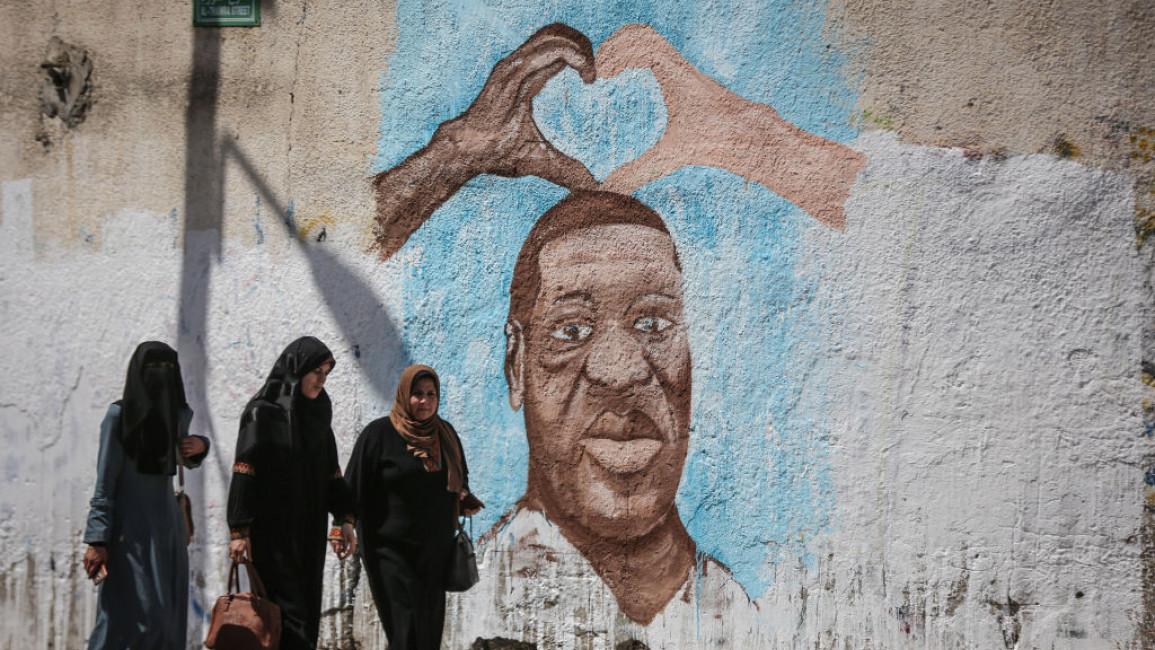
From Minneapolis to Gaza, George Floyd’s murder triggered an unstoppable reckoning
This week marks the one year anniversary of George Floyd's murder, though to many, that moment has never felt far away.
In recent weeks, the legacy of George Floyd has felt more poignant than ever after the siege of Gaza and the mass protests which rose up in response. That the slogan "Black Lives Matter" was taken up by Palestinians looking for their rights, and that a mural of George Floyd was painted in Gaza, speaks to the impact the Black Lives Matter movement and George Floyd's murder at the hands of police has had on social movements across the globe.
When Black organisers like Joseph Williams discuss why Floyd's murder became the flashpoint it did, they emphasise that it wasn't only because of how he died, but when.
In 2020, 1,021 people were killed in the US by police. Of them, 243 were Black. Statistics since 2015 tell us that Black Americans are killed by police at more than twice the rate of white Americans. We know some of their names - Sandra Bland, Breonna Taylor, Andre Hill - but we don't know the stories of the vast majority. Many never received justice - and likely never will.
Only this past week, the mother of Tamir Rice, a 12-year-old boy shot and killed by police in 2014, asked the Ohio Supreme Court not to reinstate the police officer who killed him. The police officer involved, Timothy Loehmann, was not even fired for killing Rice, but for lying on his job application.
Statistics and court outcomes tell us that the murder of George Floyd was not a unique event in 2020, let alone in the course of American history. His murder was not more brutal, the video not more disturbing, and the case not more unjust than so many others. And yet today, George Floyd's name has become synonymous with accountability, from Chicago to Gaza.
"He forced America to talk about racial injustice out in the open, and now, finally, we are beginning to see the same on the issue of Israel and Palestine"
Joseph Williams points to the pandemic as part of the reason why George Floyd's murder moved hundreds of thousands of people across the world to march for racial equality. In these hyper-digital times, there was no hiding from the viral video of his murder. And if the protests were built on a pyre, painstakingly created by years of Black Lives Matter organising, and the pandemic created the right conditions for fire to catch, then the video of George Floyd's murder was the spark that set it aflame.
As the pandemic brought about seismic shifts in society, it threw the racial, economic, and social fault lines into sharp relief. This didn't only happen in America. Throughout 2020, massive protests against police brutality rocked Nigeria, farmers' protests spread across India, and movements for racial justice spread across Europe, the United States, and reached the Middle East.
From Palestine, Rest in peace, George Floyd!#BlackLivesMatter
— Refaat Alareer 🇵🇸 (@itranslate123) May 25, 2021
via @shirien___ pic.twitter.com/u1fXCC7oq7
One year later, as America begins to get control of the pandemic, it's encouraging to see that the spirit of equality and social justice that sent people on to the streets after Floyd's murder is still alive and well. Of course, protests alone do not pass legislation or win court cases; they also did not stop the murder of 67 Black Americans by police so far in 2021. But they do start conversations inside people's homes.
When I consider George Floyd's legacy of the past year, it is that he forced America to talk about racial injustice out in the open, and now, finally, we are beginning to see the same on the issue of Israel and Palestine. The power to call out social inequality wherever we see it, to call for justice from the systems of power we live under, and to call on the world to see us as human, is one that communities of color are now invoking as a tool of solidarity, and it's boldly shaping national conversations about social justice.
As our society begins to process the shock of the pandemic, we must be careful that we don't allow the fault lines that were so visible during its course, to disappear from view. In part, that means pushing for these conversations to be worked into new legislation - be it on police reform, or holding Israel accountable for violations of international law. And something we can all do more of, is continue to organise and make space for difficult conversations about social justice and racial inequality in America, Palestine, and across the world.
"Something we can all do more of, is continue to organise and make space for difficult conversations about social justice and racial inequality in America, Palestine, and across the world"
If that is our task for the year, then our task for this week is to take a moment of silence to recognise George Floyd and those who came before him. After all, even as his name has become a calling card for social justice around the world, he wasn't a martyr for the cause of equality any more than the children killed this past week in Gaza. He was a man taken from his family too soon, and for him, we say a prayer, and we honour his legacy by calling out injustice in our neighbourhoods, and across the world.
Zaina Ujayli is an MA student at The University of Virginia focusing on nineteenth and twentieth century Arab and Arab American writers.
Follow her on Twitter: @zainaujayli
Have questions or comments? Email us at: editorial-english@alaraby.co.uk
Opinions expressed here are the author's own, and do not necessarily reflect those of her employer, or of The New Arab and its editorial board or staff.




